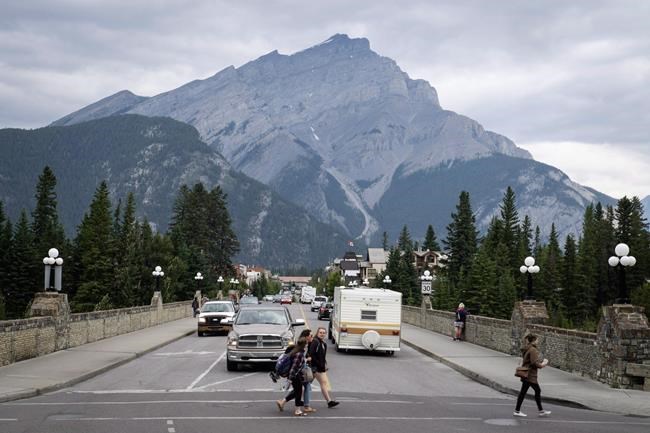Chinese tourists cancel trips to Canadian hotspots such as Banff, Yellowknife
Advertisement
Read this article for free:
or
Already have an account? Log in here »
To continue reading, please subscribe:
Monthly Digital Subscription
$0 for the first 4 weeks*
- Enjoy unlimited reading on winnipegfreepress.com
- Read the E-Edition, our digital replica newspaper
- Access News Break, our award-winning app
- Play interactive puzzles
*No charge for 4 weeks then price increases to the regular rate of $19.00 plus GST every four weeks. Offer available to new and qualified returning subscribers only. Cancel any time.
Monthly Digital Subscription
$4.75/week*
- Enjoy unlimited reading on winnipegfreepress.com
- Read the E-Edition, our digital replica newspaper
- Access News Break, our award-winning app
- Play interactive puzzles
*Billed as $19 plus GST every four weeks. Cancel any time.
To continue reading, please subscribe:
Add Free Press access to your Brandon Sun subscription for only an additional
$1 for the first 4 weeks*
*Your next subscription payment will increase by $1.00 and you will be charged $16.99 plus GST for four weeks. After four weeks, your payment will increase to $23.99 plus GST every four weeks.
Read unlimited articles for free today:
or
Already have an account? Log in here »
Hey there, time traveller!
This article was published 31/01/2020 (2141 days ago), so information in it may no longer be current.
Tour companies and hotels in destinations popular with Chinese tourists are starting to see cancellations after a new form of virus that has led to mass quarantines and more than 200 deaths in China.
The virus comes from a large family of what are known as coronaviruses. The World Health Organization on Thursday declared the outbreak a “public health emergency of international concern.”
There are four confirmed cases in Canada and all are linked to recent travel in China.

Travel agencies in the Asian country have been told to halt all group tours due to the virus, the state-owned China Daily newspaper reported, citing the China Association of Travel Services.
Travel Alberta, which works to promote tourism to the province, said it is hearing about cancellations from tour operators and hotels.
“We have not had mass waves of cancellations,” CEO Royce Chwin said in an interview. “We’ve had some cancellations — although I don’t have a qualified number.”
The cancellations include group tours to Jasper and Banff in the Rocky Mountains, he said.
Banff Lake Louise Tourism said in a statement that it has seen a minimal impact so far, but noted that staff are monitoring the situation.
“It’s early days so (we) can’t fully anticipate the impact,” said Angela Anderson, director of communications. “We are encouraging all businesses in our destination to help make any changes or cancellations as easy as possible and penalty free.
“China is an important market for us, so we are hopeful the situation gets under control as soon as possible.”
Travel Alberta said the three biggest overseas tourism markets for the province are the United Kingdom, Germany, then China.
The agency is also pausing its consumer marketing activities in China that bring tourists to Alberta.
“We run ads on social channels,” he said. “Considering what the Chinese government has asked their travel companies to do out there — that’s to not book trips out of the country — we really didn’t think it appropriate to sit here and invite people to come to Canada to travel.”
He said Travel Alberta follows the lead of Destination Canada, a federal government corporation that markets the country to international tourists.
Hysan Lee, owner and operator of Aurora Holiday Tours in Yellowknife, said he’s had about 200 cancellations in the last few weeks.
“This morning, I got five emails,” he said Thursday.
The company books tours and hotels for Chinese people travelling to the Northwest Territories.
Lee said he’s offering a full refund for the cancellations, which were mostly for February and March.
Discover Banff Tours declined to comment and other tour companies in B.C. and Alberta didn’t respond to requests for interviews.
Travel Alberta’s Chwin said he hasn’t heard about any operators or hotels that are overly worried.
“Everybody is just being proactive and has general concern, obviously, for the general well-being of people first and secondly how it might impact the business,” he said. “We’re just seeing a bit of trickle here.”
The impact, he said, is nowhere near what it was in 2003 when SARS, a viral respiratory illness also caused by a coronavirus, hit Toronto.
“SARS was centred in Canada where this is not,” said Chwin. “Canada is not the focus of attention. It really did hurt the industry back in the day when SARS happened, while this (new coronavirus) is centred in China.
“It’s not really a relevant comparison.”
This report by The Canadian Press was first published Jan. 31, 2020
— With files from The Associated Press



